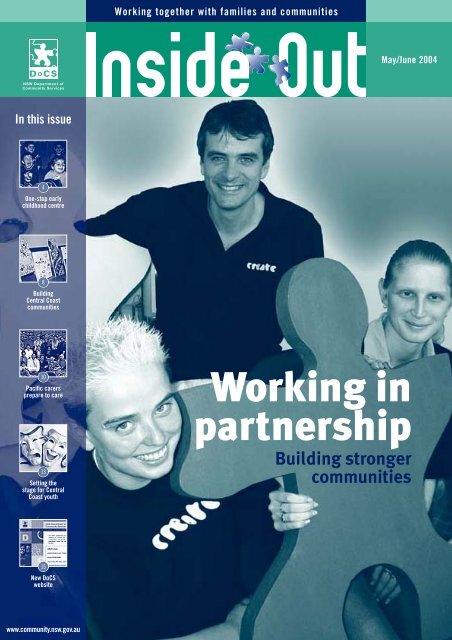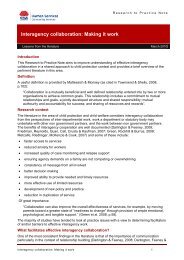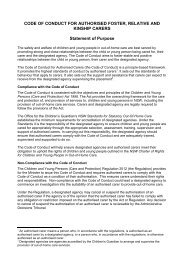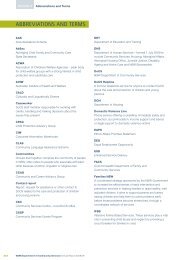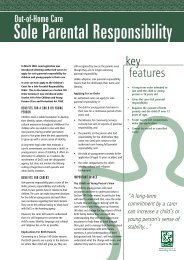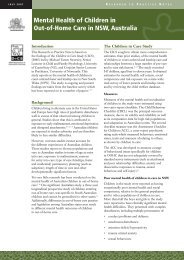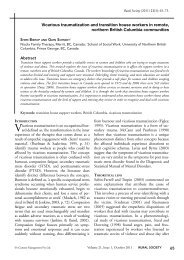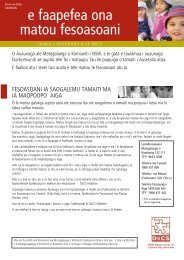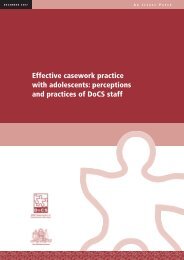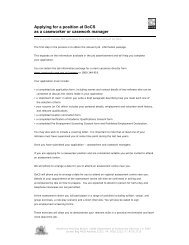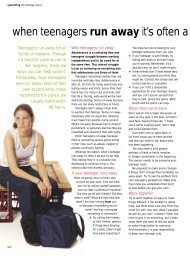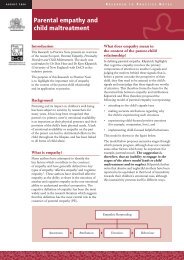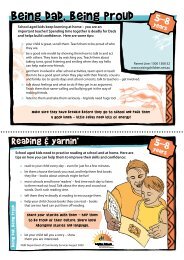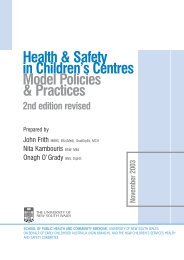select to open the May/ June Inside Out newsletter - NSW ...
select to open the May/ June Inside Out newsletter - NSW ...
select to open the May/ June Inside Out newsletter - NSW ...
Create successful ePaper yourself
Turn your PDF publications into a flip-book with our unique Google optimized e-Paper software.
Working <strong>to</strong>ge<strong>the</strong>r with families and communities<br />
<strong>May</strong>/<strong>June</strong> 2004<br />
In this issue<br />
4<br />
One-s<strong>to</strong>p early<br />
childhood centre<br />
8<br />
Building<br />
Central Coast<br />
communities<br />
10<br />
Pacific carers<br />
prepare <strong>to</strong> care<br />
13<br />
Setting <strong>the</strong><br />
stage for Central<br />
Coast youth<br />
Working in<br />
partnership<br />
Building stronger<br />
communities<br />
15<br />
New DoCS<br />
website<br />
www.community.nsw.gov.au
Partnerships <strong>to</strong> build stronger communities<br />
> Corporate Directions<br />
We also need <strong>to</strong><br />
maintain effective<br />
coordination of<br />
programs<br />
involving multiple<br />
government<br />
agencies and <strong>the</strong><br />
non-government<br />
sec<strong>to</strong>r.<br />
Neil Shepherd, DoCS Direc<strong>to</strong>r-General<br />
> Most of you should be<br />
aware that a range of programs<br />
will be transferred<br />
from <strong>the</strong> Premier’s<br />
Department and The Cabinet<br />
Office <strong>to</strong> DoCS from July this<br />
year. Families First, Better<br />
Futures, <strong>the</strong> Aboriginal Child Youth and Family<br />
Strategy and youth policy functions under <strong>the</strong><br />
Office of Children and Young People will be<br />
transferred from The Cabinet Office, while community<br />
building programs such as Streng<strong>the</strong>ning<br />
Communities, Community Solutions and place<br />
management projects will be transferred from<br />
Premier’s.The Area Assistance Scheme will be<br />
transferred from <strong>the</strong> Department of<br />
Infrastructure, Planning and Natural Resources.<br />
Around 60 staff and <strong>the</strong> current<br />
budgets attached <strong>to</strong> <strong>the</strong>se programs will<br />
transfer <strong>to</strong> DoCS.This will mean some<br />
re-structuring within DoCS, with a new<br />
Communities and Policy division<br />
established and managed by Deputy<br />
Direc<strong>to</strong>r-General, Sue Dawson.<br />
One of <strong>the</strong> reasons for <strong>the</strong> transfer<br />
was <strong>to</strong> seek any synergies across all such<br />
programs. In due course we will also<br />
look at potential improvements <strong>to</strong> community<br />
programs.This includes looking<br />
at arrangements for <strong>the</strong> programs ourselves,<br />
discussing ideas for improvements that transferred<br />
staff may have, and consulting with <strong>the</strong><br />
sec<strong>to</strong>r about <strong>the</strong>ir views for <strong>the</strong> programs in <strong>the</strong><br />
long term.<br />
The transfer raises two main issues of concern.The<br />
first is ensuring that community program<br />
funds don’t get siphoned off in<strong>to</strong> <strong>the</strong> high<br />
cost end of DoCS’ business (ie. child protection<br />
and out-of-home care).The second is how we<br />
maintain effective coordination of programs<br />
involving multiple government agencies and <strong>the</strong><br />
non-government sec<strong>to</strong>r (eg. Families First).<br />
Preventing <strong>the</strong> siphoning of funds is easy.<br />
We already do this – DoCS’ has not transferred<br />
o<strong>the</strong>r program funds <strong>to</strong> out-of-home care in<br />
2003/04 despite a $25 million overrun in costs<br />
for high needs kids.The commitment is that we<br />
will not transfer community program funds <strong>to</strong><br />
meet statu<strong>to</strong>ry child protection or out-of-home<br />
care needs.<br />
Maintaining effective coordination of multifaceted<br />
programs also means <strong>the</strong> regional coordina<strong>to</strong>r<br />
positions don’t become <strong>the</strong> coordina<strong>to</strong>r<br />
AND <strong>the</strong> DoCS’ representative for <strong>the</strong> program.<br />
DoCS will remain separately represented.<br />
Effective coordination also means government<br />
agencies need <strong>to</strong> retain <strong>the</strong>ir individual<br />
commitment <strong>to</strong> <strong>the</strong>se programs.This has already<br />
been raised with all Human Services CEOs at<br />
<strong>the</strong>ir April meeting, with a clear commitment<br />
<strong>to</strong> continued support.<br />
There will also be a regular reporting<br />
arrangement <strong>to</strong> <strong>the</strong> Human Services CEOs<br />
Forum about <strong>the</strong>se multi-agency programs.<br />
The Forum has agreed <strong>to</strong> this in-principle,<br />
with DoCS <strong>to</strong> bring a formal proposal <strong>to</strong> a<br />
meeting in <strong>the</strong> near future.<br />
It is DoCS’ very clear intention <strong>to</strong> ensure<br />
that community programs are properly<br />
governed after <strong>the</strong> transfer and that <strong>the</strong>y are<br />
improved wherever possible.<br />
I will keep you informed about future<br />
developments.<br />
2<br />
Cover:The Create Foundation works in partnership with DoCS <strong>to</strong> support out-of-home-care kids.<br />
<strong>Inside</strong> <strong>Out</strong> is published by:<br />
<strong>NSW</strong> Department of Community Services.<br />
Locked Bag 28<br />
Ashfield <strong>NSW</strong> 1800<br />
(02) 9716 2222<br />
www.community.nsw.gov.au<br />
Copyright © <strong>NSW</strong> Department of Community Services 2004<br />
ISSN: 1442-0031<br />
All rights reserved. Except as provided in <strong>the</strong> Copyright Act<br />
(1988 Commonwealth), no use of this work which is within <strong>the</strong><br />
exclusive right of <strong>the</strong> copyright owner may be made. No part<br />
of this work may be reproduced, translated, modified, reduced,<br />
transmitted or s<strong>to</strong>red in any form or by any means, electronic<br />
or mechanical, including pho<strong>to</strong>copying and recording, or by any<br />
information s<strong>to</strong>rage or retrieval system without prior written<br />
permission of <strong>the</strong> <strong>NSW</strong> Department of Community Services<br />
(DoCS). Requests and enquiries concerning reproduction and<br />
rights are welcome and should be addressed <strong>to</strong>: Edi<strong>to</strong>r <strong>Inside</strong><br />
<strong>Out</strong>, <strong>NSW</strong> Department of Community Services, Locked Bag 28,<br />
Ashfield <strong>NSW</strong> 1800.While every care has been taken in <strong>the</strong><br />
preparation of <strong>Inside</strong> <strong>Out</strong> and <strong>the</strong> information it contains is<br />
believed <strong>to</strong> be accurate, DoCS suggests that professional advice<br />
be sought where necessary. DoCS cannot be liable for any error,<br />
omission or for damages arising from <strong>the</strong> supply, performance or<br />
use of <strong>Inside</strong> <strong>Out</strong> and makes no warranty of any kind, ei<strong>the</strong>r<br />
expressed or implied in relation <strong>to</strong> it.<br />
Produced by Lodestar Communications. (02) 9211 2682. Suite 408, 3 Smail Street, Ultimo, <strong>NSW</strong> 2007.<br />
INSIDE OUT | <strong>May</strong>/<strong>June</strong> 2004 | | www.community.nsw.gov.au
Funding News<br />
One-s<strong>to</strong>p early<br />
childhood centre<br />
> An innovative, early childhood centre, complete<br />
with speech <strong>the</strong>rapists, early childhood<br />
health professionals and a chef <strong>to</strong> prepare hot<br />
meals for families <strong>to</strong> take home after a busy day,<br />
has <strong>open</strong>ed in Eastwood in Sydney.<br />
The Somerville Park Early Childhood<br />
Education Centre, a 48-place long-day-care centre<br />
for children from birth <strong>to</strong> school age, has set<br />
new standards in children’s services in nor<strong>the</strong>rn<br />
Sydney by offering a range of health and educational<br />
services on-site and o<strong>the</strong>r practical familyfriendly<br />
services.<br />
Families can access <strong>the</strong> Lifestart Early<br />
Intervention Program for children with additional<br />
needs and <strong>the</strong> Noah’s Ark Toy Library – a specialist<br />
mobile <strong>to</strong>y library service.<br />
DoCS has provided more than $420,000 <strong>to</strong><br />
Hornsby Shire Council for <strong>the</strong> construction of<br />
<strong>the</strong> Early Childhood Centre and almost $24,000<br />
annually in recurrent funding.<br />
Hornsby Council under<strong>to</strong>ok comprehensive<br />
research on <strong>the</strong> needs of local families prior <strong>to</strong><br />
constructing <strong>the</strong> centre, and found what families<br />
needed was a centre that provided <strong>the</strong>m with a<br />
range of practical services from <strong>the</strong> one location.<br />
The Somerville Park Early Childhood<br />
Education Centre has also recruited a number<br />
of bilingual staff, with half <strong>the</strong> children accessing<br />
<strong>the</strong> service from culturally and linguistically<br />
diverse backgrounds.<br />
Somerville is a pro<strong>to</strong>type for two more services<br />
planned by Hornsby Shire Council. A<br />
> Early Intervention<br />
and Prevention<br />
Early childhood research<br />
in south west<br />
Helping childcare<br />
workers better engage<br />
families from culturally and<br />
linguistically diverse (CALD)<br />
backgrounds was <strong>the</strong> focus<br />
of a series of workshops<br />
held in Sydney’s south west<br />
in late February.<br />
The workshops marked <strong>the</strong><br />
launch of a new resource handbook for childcare workers that<br />
includes practical ways of reaching out <strong>to</strong> CALD families such<br />
as building support networks through <strong>the</strong> promotion of cultural<br />
celebrations and involving family representatives from different<br />
cultural and language groups.<br />
The initiative is <strong>the</strong> result of research commissioned by<br />
DoCS through <strong>the</strong> Government’s Families First strategy and was<br />
conducted by <strong>the</strong> University of Western Sydney (UWS). DoCS<br />
funding of $80,500 allowed for interpreters <strong>to</strong> be used in<br />
consultations with local communities.<br />
The UWS research team, led by Associate Professor<br />
Jacqueline Hayden and Dr Katey De Gioia, previously developed<br />
<strong>the</strong> ‘Health Promoting Early Childhood Services Program’. This<br />
new study was an extension of that program.<br />
The research team worked closely with staff and families<br />
from childcare centres in south west Sydney <strong>to</strong> uncover some of<br />
<strong>the</strong> real and perceived barriers <strong>to</strong> relationship building and<br />
communication with CALD families.<br />
“Both parents and staff reported improved communications<br />
and better networks as a result of <strong>the</strong> program,”<br />
Dr De Gioia said.<br />
Five steps for facilitating<br />
partnerships and networks<br />
with CALD families<br />
1. Develop an Action Plan – Identify goals for facilitating<br />
partnerships, communication and networking<br />
2. Recruit a ‘Family Representative’ <strong>to</strong> support family liaison<br />
(eg. a parent of a child at <strong>the</strong> centre who can represent one<br />
or more of <strong>the</strong> CALD families within <strong>the</strong> service)<br />
3. Assess current communication strategies in <strong>the</strong> service<br />
4. Develop and implement ‘Action Plans’<br />
5. Assess <strong>the</strong> program and re-commence planning cycle<br />
For more information visit www.healthychildhood.org A<br />
3<br />
<strong>NSW</strong> Department of Community Services | | <strong>May</strong>/<strong>June</strong> 2004 | INSIDE OUT
Children’s Services<br />
Exchanging tales from<br />
bush and city life<br />
> It’s a 457 kilometre drive from Gilgandra <strong>to</strong><br />
Glenorie but distance will not s<strong>to</strong>p a unique<br />
sister-service relationship developing between <strong>the</strong><br />
Glenorie Pre-School in Sydney’s north-west and<br />
<strong>the</strong> Gilgandra Boori’s Playgroup in western <strong>NSW</strong>.<br />
DoCS’ Nor<strong>the</strong>rn Sydney Aboriginal<br />
Community Program Officer, Larry Trudgett,<br />
has initiated a relationship between <strong>the</strong> two<br />
early childhood services, which will have<br />
invaluable benefits for <strong>the</strong> children, parents and<br />
staff of both services.<br />
Children from Gilgandra and Glenorie will<br />
share drawings, pictures and <strong>the</strong>ir experiences<br />
of living in <strong>the</strong> city and bush. But <strong>the</strong> real<br />
benefit will be in<br />
sharing cultures,<br />
with <strong>the</strong> Gilgandra<br />
Playgroup, made up<br />
predominantly of<br />
Aboriginal children,<br />
sharing <strong>the</strong>ir culture<br />
with <strong>the</strong> Glenorie<br />
children.<br />
“DoCS is<br />
committed <strong>to</strong><br />
supporting children’s<br />
services and <strong>the</strong><br />
Department<br />
encourages unique<br />
ways for services <strong>to</strong> work <strong>to</strong>ge<strong>the</strong>r in caring<br />
for and educating children before school,”<br />
Larry said.<br />
“The children at Gilgandra have a unique<br />
s<strong>to</strong>ry <strong>to</strong> share about life as Aboriginal children in<br />
<strong>the</strong> bush.Also, <strong>the</strong> children from Glenorie will<br />
no doubt have some great tales <strong>to</strong> share about<br />
growing up in <strong>the</strong> big smoke.<br />
“This unique relationship will expose <strong>the</strong><br />
children at Glenorie <strong>to</strong> Aboriginal his<strong>to</strong>ry<br />
and give <strong>the</strong>se young children a window <strong>to</strong><br />
Aboriginal culture.The two services may also<br />
Kids from Glenorie wanted <strong>to</strong> share a s<strong>to</strong>ry with <strong>the</strong> Gilgandra kids<br />
about life at <strong>the</strong> Glenorie Pre-School, so <strong>the</strong>y produced a book,<br />
complete with drawings and s<strong>to</strong>ries.<br />
identify ways <strong>to</strong> celebrate national cultural<br />
events, such as <strong>the</strong> National Aboriginal and<br />
Islander Day Observance Committee Week,”<br />
Larry said.<br />
“DoCS hopes this relationship will also<br />
include families and staff. Both services have<br />
<strong>the</strong>ir own ways of educating and caring for<br />
<strong>the</strong>ir children and we encourage <strong>the</strong>m <strong>to</strong> share<br />
<strong>the</strong>se ideas.”<br />
The Glenorie Pre-School children have<br />
already made contact with <strong>the</strong>ir friends from<br />
Gilgandra and are preparing a special book<br />
about <strong>the</strong>ir activities at pre-school <strong>to</strong> send <strong>to</strong><br />
Gilgandra.<br />
“The children<br />
wanted <strong>to</strong> share a<br />
s<strong>to</strong>ry about life at <strong>the</strong><br />
Glenorie Pre-School,<br />
so <strong>the</strong>y have<br />
produced a book,<br />
complete with<br />
drawings and s<strong>to</strong>ries,”<br />
said Glenorie Pre-<br />
School Direc<strong>to</strong>r,<br />
Justine Sheeba.<br />
Gilgandra<br />
Boori’s Playgroup<br />
Coordina<strong>to</strong>r, Pat<br />
Naden, said many of<br />
<strong>the</strong> children who access <strong>the</strong> service have never<br />
been <strong>to</strong> Sydney.<br />
“The beauty of this special relationship is<br />
that it exposes <strong>the</strong>se children, all under <strong>the</strong> age<br />
of five, <strong>to</strong> a lifestyle in a place so far away that<br />
<strong>the</strong>y never knew existed,” Ms Naden said.<br />
Larry believes <strong>the</strong> sister-service relationship<br />
between Gilgandra and Glenorie will <strong>open</strong><br />
exciting doors for early childhood centres in<br />
Sydney’s north and rural <strong>NSW</strong>. DoCS has<br />
already linked six nor<strong>the</strong>rn Sydney pre-schools<br />
<strong>to</strong> Aboriginal services in <strong>the</strong> bush. A<br />
4<br />
But <strong>the</strong> real benefit will be in sharing cultures … The children at Gilgandra<br />
have a unique s<strong>to</strong>ry <strong>to</strong> share about life as Aboriginal children in <strong>the</strong> bush.<br />
Also, <strong>the</strong> children from Glenorie will have some great tales <strong>to</strong> share.<br />
INSIDE OUT | <strong>May</strong>/<strong>June</strong> 2004 | | www.community.nsw.gov.au
KARI caring for kids<br />
> With 17 Aboriginal foster carers on <strong>the</strong>ir<br />
books and 10 new carers about <strong>to</strong> begin training,<br />
KARI Aboriginal Resources Inc (KARI) – based in<br />
Sydney’s south west – has plenty <strong>to</strong> smile about.<br />
Earlier this year, KARI received a <strong>NSW</strong><br />
Government Community Service Award in<br />
recognition and appreciation of its outstanding<br />
services <strong>to</strong> <strong>the</strong> community and <strong>the</strong> service also<br />
secured additional funding <strong>to</strong> <strong>open</strong> a new<br />
branch in Campbell<strong>to</strong>wn in April.<br />
Funded by DoCS, KARI is an independent<br />
Aboriginal community-based service located in<br />
Liverpool and coordinates out-of-home care for<br />
indigenous children and youth in south west<br />
Sydney.There are currently 20 indigenous<br />
children in “KARI care”.<br />
According <strong>to</strong> Chief Executive Officer Paul<br />
Ralph, KARI is expanding its portfolio of<br />
services.The service also runs a clinic <strong>to</strong> assess<br />
<strong>the</strong> health needs of children and youth entering<br />
care and is about <strong>to</strong> launch a three-day<br />
residential program for its carers and <strong>the</strong>ir<br />
children in Oc<strong>to</strong>ber 2004.<br />
“KARI only takes referrals from DoCS and<br />
advocates a team approach, working closely<br />
with DoCS caseworkers. Our service regularly<br />
attends consultation meetings with DoCS and<br />
also liaises with Health and Education,”<br />
explained Paul.<br />
Front <strong>to</strong> back: KARI CEO Paul Ralph, KARI OOHC Manager<br />
Jacqui Edwards and DoCS Direc<strong>to</strong>r of Partnership and<br />
Planning Adele Brookes with KARI staff.<br />
KARI offers a specialist and culturally<br />
sensitive service aimed at ensuring Koori<br />
children do not lose <strong>the</strong>ir cultural identity.<br />
By employing a range of activities involving<br />
children and carers, KARI’s focus is <strong>to</strong> “raise<br />
<strong>the</strong> value” of indigenous culture.<br />
“We want <strong>the</strong> children <strong>to</strong> be proud of who<br />
<strong>the</strong>y are.We provide opportunities for Koori<br />
kids <strong>to</strong> meet o<strong>the</strong>r Koori kids, <strong>to</strong> interact, share<br />
life s<strong>to</strong>ries and do things like play <strong>the</strong> didge,”<br />
said Paul. A<br />
> Services in Action<br />
Baby Brian thrives on KARI care<br />
Baby Brian* was born in<strong>to</strong> <strong>the</strong> world only <strong>to</strong> face <strong>the</strong><br />
immediate challenge of withdrawing from methadone – a<br />
process that would take approximately four months. His<br />
mo<strong>the</strong>r and fa<strong>the</strong>r could not care for him.<br />
“We were asked by DoCS <strong>to</strong> find crisis care for this little<br />
baby and we found a carer who had worked as a Karitanetrained<br />
nurse,” said Jacqui Edwards, Manager <strong>Out</strong>-of-Home<br />
Care for KARI.<br />
“We needed <strong>to</strong> provide support <strong>to</strong> reduce <strong>the</strong> risk of this<br />
placement breaking down. We provided regular respite for<br />
<strong>the</strong> carer and her family, as <strong>the</strong> baby was screaming a lot<br />
as a result of <strong>the</strong> withdrawal process. We also provided<br />
practical resources such as a baby capsule for <strong>the</strong> car.”<br />
Brian remained with his foster family until he was<br />
eight months old and <strong>the</strong> courts determined he would live<br />
with his paternal aunt. The carer and her family (which<br />
included a teenager and two children aged eight and five)<br />
provided a wonderful home for baby Brian and – with<br />
support from KARI – <strong>the</strong> baby thrived.<br />
KARI staff liaised regularly with <strong>the</strong> DoCS caseworker,<br />
attending case conferences and providing information<br />
related <strong>to</strong> <strong>the</strong> placement and Brian’s health. KARI also<br />
supported <strong>the</strong> access and res<strong>to</strong>ration process when it was<br />
time for Brian <strong>to</strong> leave.<br />
“KARI provided grief and counselling services <strong>to</strong> <strong>the</strong><br />
foster family as <strong>the</strong>y had become very attached <strong>to</strong> him.<br />
They are still in <strong>to</strong>uch <strong>to</strong>day with <strong>the</strong> paternal aunt.” A<br />
KARI targets <strong>the</strong> local Aboriginal community <strong>to</strong> secure<br />
Aboriginal carers. Word of mouth is <strong>the</strong> most powerful<br />
advertisement.<br />
*Name has been changed <strong>to</strong> protect identity.<br />
5<br />
<strong>NSW</strong> Department of Community Services | | <strong>May</strong>/<strong>June</strong> 2004 | INSIDE OUT
From <strong>the</strong> Regions<br />
What’s happening in DoCS Regions across <strong>NSW</strong><br />
> Metro Central<br />
Information links<br />
> Education website for multicultural families<br />
A website <strong>to</strong> help multicultural families in Sydney’s north<br />
access information about early childhood education was<br />
recently expanded <strong>to</strong> include information in five community<br />
languages. The Childlink website has been translated in<strong>to</strong><br />
traditional and simplified Chinese, Japanese, Korean and<br />
Italian and provides families with information <strong>to</strong> help <strong>the</strong>m<br />
make choices about early childhood education. The site<br />
offers advice on how <strong>to</strong> assess information on staff-<strong>to</strong>children<br />
ratios, educational programs, hours of care, <strong>the</strong><br />
cost of <strong>the</strong> centre and <strong>the</strong> centre’s physical environment.<br />
DoCS has provided more than $30,000 during <strong>the</strong> past five<br />
years <strong>to</strong> establish and maintain <strong>the</strong> Childlink website,<br />
which attracted 17,000 hits in January 2004 alone. The<br />
Childlink website is a joint project between DoCS and a<br />
Community Education Working Group made up of local early<br />
childhood education professionals in Nor<strong>the</strong>rn Sydney.<br />
Visit <strong>the</strong> site at www.childlink.com.au.<br />
> Metro South West<br />
Helping hand for families<br />
> Vietnamese volunteers trained <strong>to</strong> help families<br />
Vietnamese parents with young children in <strong>the</strong> Banks<strong>to</strong>wn<br />
area will soon be receiving support and assistance from<br />
trained Vietnamese volunteers under a new Families First<br />
volunteer home visiting program. DoCS Metro South West<br />
Regional Direc<strong>to</strong>r Anne Campbell said Karitane Volunteer<br />
Programs is conducting a volunteer home visiting program<br />
in Vietnamese. The program is designed <strong>to</strong> better prepare<br />
volunteers for providing practical parenting advice, support<br />
and social contact for Banks<strong>to</strong>wn families with young<br />
children, particularly those with children aged under four<br />
years and first-time parents. Ms Campbell said a recent<br />
call from Karitane for Vietnamese volunteers was answered<br />
by 19 men and women eager <strong>to</strong> visit Vietnamese families in<br />
<strong>the</strong>ir homes <strong>to</strong> offer friendship, parenting tips and<br />
emotional support.<br />
> Marrickville Women’s Day<br />
DoCS was one of about 18 government agencies and local<br />
community organisations that contributed <strong>to</strong> and attended<br />
International Women’s Day celebrations at Marrickville on<br />
9 March. About 500 people were at <strong>the</strong> Debbie and Abbey<br />
Borgia Community Recreation Centre, Steel Park, for <strong>the</strong> big<br />
day. On offer were a range of free activities for local women,<br />
including leisure, recreation and arts, and workshops with a<br />
learning and education focus. DoCS contributed $500<br />
<strong>to</strong>wards payment for <strong>the</strong> presenters/consultants and helped<br />
out on <strong>the</strong> day with registrations.<br />
A recent call from Karitane for Vietnamese volunteers was answered by<br />
19 men and women eager <strong>to</strong> visit Vietnamese families in <strong>the</strong>ir homes.<br />
6<br />
INSIDE OUT | <strong>May</strong>/<strong>June</strong> 2004 | | www.community.nsw.gov.au
Focus on multicultural families<br />
> Families First partnership in Auburn<br />
Auburn Migrant Resource Centre was recently provided with<br />
$60,000 in DoCS/Families First funding <strong>to</strong> undertake a new<br />
Early Intervention Families Support Worker Project. This<br />
project involved working with newly-arrived migrant and<br />
refugee families <strong>to</strong> provide support by delivering services in<br />
<strong>the</strong>ir own languages through training a casual pool of<br />
bilingual community assistants (BCAs). The course covered<br />
a range of <strong>to</strong>pics including family services, communicating<br />
with parents and children, problems families have when<br />
migrating <strong>to</strong> Australia, interpersonal skills and an<br />
introduction <strong>to</strong> child development and child safety.<br />
Languages spoken by participants include Dinka, Bary,<br />
Arabic, Farsi/Dari, Bosnian, Tigrinya, Chinese, Somali, Tamil<br />
and Hindi. The BCAs work with <strong>the</strong> Families First family<br />
support coordina<strong>to</strong>r <strong>to</strong> assist with home visits and provide<br />
practical support. For more information, contact Community<br />
Program Officer Marilyn Fischer on (02) 9208 4564.<br />
> Granville Multicultural Festival<br />
Granville Multicultural Community Centre (GMCC) has been<br />
busy preparing for <strong>the</strong> 8th Granville Multicultural Festival –<br />
held 1 <strong>May</strong> 2004. GMCC Manager, Mark Drury says <strong>the</strong><br />
Centre has been a hub of activity, thanks <strong>to</strong> DoCS funding.<br />
The Centre has a dynamic youth work team, responsible for<br />
award-winning projects such as <strong>the</strong> “Youth In Our<br />
The project involved working with newly-arrived migrant and refugee families<br />
<strong>to</strong> provide support by delivering services in <strong>the</strong>ir own languages through<br />
training a casual pool of bilingual community assistants.<br />
Reaching remote communities<br />
> Boost for Riverina Murray families<br />
Families First services in <strong>the</strong> Riverina Murray area are set<br />
<strong>to</strong> expand and support more families needing a helping<br />
hand. Expressions of interest for more than $800,000 in<br />
funding <strong>to</strong> develop three volunteer home visiting services <strong>to</strong><br />
support families in <strong>the</strong> Riverina Murray area closed in April.<br />
Under <strong>the</strong> Families First initiative, funding has been made<br />
available through DoCS <strong>to</strong> develop three volunteer home<br />
visiting service projects covering <strong>the</strong> areas of Gundagai,<br />
Tumut and Tumbarumba; Berrigan, Corowa and Jerilderie;<br />
and Culcairn, Holbrook, Lockhart and Urana LGAs. The<br />
funding is recurrent for three years and includes a one-off<br />
Community” project - a partnership with Granville South<br />
High School and local youth workers and facilities. Mark<br />
said <strong>the</strong> Centre plans <strong>to</strong> work with community partners <strong>to</strong><br />
address some of <strong>the</strong> inter-generational issues that are<br />
arising between parents and children. The Centre also<br />
hosts a Families First Community Hub – running a number<br />
of playgroups and parenting programs.<br />
> Rivers<strong>to</strong>ne Community Hub<br />
Families in <strong>the</strong> Rivers<strong>to</strong>ne area recently welcomed <strong>the</strong><br />
launch of <strong>the</strong> Rivers<strong>to</strong>ne Community Hub – funded by<br />
DoCS/Families First with $108,000 (over three years).<br />
Launched on 20 March, <strong>the</strong> Hub will offer resources <strong>to</strong><br />
support families with children aged 0-8, including<br />
supported playgroups and access <strong>to</strong> parenting programs.<br />
establishment payment of up <strong>to</strong> $40,000. The Riverina<br />
Murray area will also benefit from three new supported<br />
playgroups. Expressions of interest were sought for a<br />
multicultural supported playgroup <strong>to</strong> be based in <strong>the</strong><br />
Griffith Local Government area; a supported playgroup for<br />
families in <strong>the</strong> Temora and surrounds area; and a mobile<br />
playgroup reaching remote areas of Corowa-Urana-Hume.<br />
“A network of supported playgroups in <strong>the</strong> Riverina Murray<br />
area will be a real boost for families with young children,<br />
particularly those who are isolated and have difficulty<br />
accessing transport,” said Glynis Ingram, DoCS Regional<br />
Direc<strong>to</strong>r Western.<br />
> Metro West > Western<br />
Under <strong>the</strong> Families First initiative, funding has been made available <strong>to</strong> develop<br />
three volunteer home visiting service projects in <strong>the</strong> Riverina Murray area.<br />
7<br />
<strong>NSW</strong> Department of Community Services | | <strong>May</strong>/<strong>June</strong> 2004 | INSIDE OUT
From <strong>the</strong> Regions continued from page 7<br />
> Nor<strong>the</strong>rn<br />
Building capacity<br />
> Far North Coast Development Day<br />
Staff from DoCS’ Far North Coast and <strong>the</strong> Shared<br />
Vision Aboriginal Corporation Inc co-sponsored a highly<br />
successful Community Development Day in Lismore in<br />
February. Around 130 Indigenous staff from government<br />
and non-government agencies attended. With an address<br />
from National Aboriginal leader Mick Dodson, <strong>the</strong> day was<br />
organised as part of DoCS’ strategy <strong>to</strong> develop leadership<br />
and community capacity-building skills under <strong>the</strong> Yareka<br />
initiative.<br />
> New Centre for Children & Young People<br />
On 20 February, 10 DoCS staff from Nor<strong>the</strong>rn Region<br />
attended a one-day conference at Sou<strong>the</strong>rn Cross<br />
University <strong>to</strong> mark <strong>the</strong> <strong>open</strong>ing of <strong>the</strong> Centre for Children<br />
and Young People. The Centre will undertake research,<br />
education and advocacy with particular emphasis on <strong>the</strong><br />
needs of children in rural Australia. The conference was<br />
addressed by Dr Tony Vinson and Dr Judy Cashmore and<br />
chaired by journalist Geraldine Doogue. DoCS is already<br />
seeking <strong>to</strong> work with <strong>the</strong> new Centre <strong>to</strong> look at <strong>the</strong> needs<br />
of children involved in protracted care matters in <strong>the</strong><br />
Children’s Court.<br />
> Supported<br />
playgroups make<br />
a difference<br />
Raising awareness<br />
about <strong>the</strong> way supported<br />
playgroups can make a<br />
positive difference <strong>to</strong><br />
families with young children<br />
was <strong>the</strong> focus of a major<br />
conference hosted by DoCS in late February. Speaking at <strong>the</strong><br />
<strong>open</strong>ing of <strong>the</strong> New England Supported Playgroup<br />
Conference in Armidale, DoCS Direc<strong>to</strong>r Partnership and<br />
Planning, Ms Pam Brunner said <strong>the</strong>re were nine supported<br />
playgroups funded by DoCS/Families First in <strong>the</strong> region,<br />
including Aboriginal supported playgroups at Glen Innes,<br />
Quirindi and Tingha. About 75 people attended <strong>the</strong> two-day<br />
conference, including local supported playgroup staff and<br />
playgroup representatives from Dubbo, <strong>the</strong> <strong>NSW</strong> Mid North<br />
Coast and Far North Coast. The keynote speaker, Professor<br />
Peter Jones, Direc<strong>to</strong>r of Newcastle University’s Department<br />
of Rural Health, spoke on “Understanding your child’s<br />
developmental stage <strong>to</strong> try and understand and enjoy how<br />
<strong>the</strong>y behave”. DoCS Aboriginal Community Development<br />
Officer for <strong>the</strong> New England area, Daniel Teece Johnson, also<br />
presented at <strong>the</strong> conference and was <strong>the</strong> key organiser.<br />
The Community Development Day was organised as part of DoCS’<br />
strategy <strong>to</strong> develop leadership and community capacity-building<br />
skills under <strong>the</strong> Yareka initiative.<br />
8<br />
> Hunter and Central Coast<br />
Help where needed<br />
> Engaging communities<br />
The Central Coast Community Congress held in March<br />
focused on community engagement – building community<br />
partnerships and nurturing community-building initiatives.<br />
Attended by more than 200 delegates, key <strong>the</strong>mes explored<br />
included building resilient and sustainable communities,<br />
streng<strong>the</strong>ning communities and community capacity building,<br />
asset-based community development, and social enterprise<br />
and community-business partnerships. The Congress<br />
included keynote speakers from both Australia and overseas<br />
as well as an opportunity <strong>to</strong> showcase local innovative work<br />
and projects – such as <strong>the</strong> Fridge Door Project (pictured<br />
right). DoCS contributed $10,000 for <strong>the</strong> event and joining<br />
several local councils and o<strong>the</strong>r agencies in organising<br />
<strong>the</strong> ga<strong>the</strong>ring.<br />
> Help at home<br />
Staff and volunteers of UnitingCare Burnside’s “New Steps<br />
Home Visiting Program” have provided support for more than<br />
140 Central Coast parents in <strong>the</strong> past seven months and<br />
<strong>the</strong>re’s more support on <strong>the</strong> way following <strong>the</strong> allocation of<br />
$1 million over three years by DoCS through Families First.<br />
New Steps has been providing vital support for families and<br />
Continued on page 9<br />
INSIDE OUT | <strong>May</strong>/<strong>June</strong> 2004 | | www.community.nsw.gov.au
carers in <strong>the</strong>ir homes since August last year through <strong>the</strong><br />
employment of professionals and trained volunteers offering<br />
friendship, parenting tips and practical support, particularly<br />
<strong>to</strong> families with children aged under two years.<br />
> Worker caring for Aboriginal mo<strong>the</strong>rs and babies<br />
Aboriginal families in <strong>the</strong> Wyong and Gosford region are<br />
benefiting from <strong>the</strong> arrival of an Aboriginal Mo<strong>the</strong>rs and<br />
Babies Worker – a position funded by DoCS. The position<br />
is based at <strong>the</strong> Yerin Aboriginal Health Services Eleanor<br />
Duncan Health Centre and provides timely intervention<br />
and support <strong>to</strong> families during <strong>the</strong> perinatal and postnatal<br />
period. The position is responsible for <strong>the</strong> Aboriginal<br />
Maternal and Newborn Health Project, which is designed<br />
<strong>to</strong> support Aboriginal women and <strong>the</strong>ir families attending<br />
ante-natal care, admitted for delivery and postnatal care<br />
for up <strong>to</strong> six weeks, or until linked with o<strong>the</strong>r support<br />
services such as child health services or <strong>the</strong> home visiting<br />
program. The $221,400 DoCS-funded initiative will improve<br />
collaboration and coordination between Central Coast<br />
services involved in supporting Aboriginal families.<br />
> Newcastle foster carer recognised<br />
When Valencia Ashbourne first became a foster carer in 1964,<br />
man was yet <strong>to</strong> land on <strong>the</strong> moon. Forty-years later, <strong>the</strong><br />
Newcastle foster carer and a recipient of <strong>the</strong> 2004 Order of<br />
Australia Medal (OAM) is one of <strong>the</strong> Hunter’s most regarded<br />
foster carers and has played a key role in providing support <strong>to</strong><br />
foster carers in <strong>the</strong> region. Her contribution <strong>to</strong> <strong>the</strong> community<br />
was officially recognised when DoCS presented Valencia with<br />
an official letter of recognition from <strong>the</strong> <strong>NSW</strong> Minister for<br />
Community Services, Carmel Tebbutt. Valencia established <strong>the</strong><br />
Newcastle/Lake Macquarie Foster Carers Association in 1978,<br />
<strong>the</strong> longest running Regional Faster Care Support Group in<br />
<strong>NSW</strong>. She served as President of this group for 13 years, until<br />
2002, and was also President of <strong>the</strong> <strong>NSW</strong> Foster Carers<br />
Association in 1994. Valencia and her husband Brian (pictured<br />
above) became foster carers with Centacare in 1964. Their<br />
eldest foster child is now 40 years old and <strong>the</strong>ir family<br />
includes 14 grandchildren from <strong>the</strong>ir adopted child and two<br />
long-term foster children.<br />
> Hunter and Central Coast<br />
The New Steps program is designed <strong>to</strong> help parents and carers<br />
enjoy <strong>the</strong> rewards and experiences of raising a child, and find ways<br />
<strong>to</strong> cope with <strong>the</strong> demands of a growing child.<br />
Giving kids a good start<br />
> Clipper Road upgrade<br />
Clipper Road Child Care Centre in East Nowra will receive a<br />
major upgrade following funding announced in March. Oneoff<br />
funding of up <strong>to</strong> $120,000 from DoCS will allow <strong>the</strong><br />
Clipper Road Child Care Centre <strong>to</strong> meet previous<br />
commitments as well as progressively undergo significant<br />
improvements. Priority will be given <strong>to</strong> key refurbishment<br />
projects including a sandpit cover, upgraded bottle<br />
preparation and nappy change areas, a shaded outdoor<br />
play area, new screens and new doors as well as upgraded<br />
on-site security. The Clipper Road Child Care Centre is a<br />
community based childcare centre managed by Illawarra<br />
Area Child Care Ltd and is licensed by DoCS <strong>to</strong> provide care<br />
for 40 children.<br />
> Volunteer home visi<strong>to</strong>rs<br />
Parents of young children throughout Sou<strong>the</strong>rn <strong>NSW</strong> will<br />
benefit from new funding <strong>to</strong> establish four separate<br />
Families First Volunteer Home Visiting Services in <strong>the</strong><br />
Eurobodalla, Bega Valley, Cooma-Monaro and Queanbeyan<br />
areas. The funding, which <strong>to</strong>tals $532,000, is made up of<br />
four separate grants from DoCS over 30 months. Local<br />
organisation, Campbell Page, was awarded <strong>the</strong> contract <strong>to</strong><br />
provide volunteer home visiting services <strong>to</strong> work with local<br />
families in <strong>the</strong>se areas. Volunteers for <strong>the</strong>se services are<br />
being sought and training will begin soon.<br />
> Sou<strong>the</strong>rn<br />
9<br />
<strong>NSW</strong> Department of Community Services | | <strong>May</strong>/<strong>June</strong> 2004 | INSIDE OUT
10<br />
> <strong>Out</strong>-of-Home Care News<br />
Wanted: Pacific<br />
carers in south west<br />
Members of Pacific communities ga<strong>the</strong>r with DoCS’ Pacific staff<br />
<strong>to</strong> learn about foster caring.<br />
> Pacific community leaders and DoCS recently<br />
joined forces <strong>to</strong> recruit more Pacific foster carers in<br />
Sydney’s south west.<br />
DoCS hosted a special meeting of community<br />
leaders from Maori, Samoan,Tongan, Fijian, Cook<br />
Islands and Niue communities at <strong>the</strong> Campbell<strong>to</strong>wn<br />
Community Services Centre (CSC) in February <strong>to</strong> talk<br />
about <strong>the</strong> importance of foster caring in <strong>the</strong> lives of<br />
Pacific children.<br />
The initiative was <strong>the</strong> brainchild of Steve Yatman<br />
and Tamena Yarek from DoCS Metro South West’s<br />
<strong>Out</strong>-of-Home Care team and is recognition of <strong>the</strong><br />
need <strong>to</strong> place Pacific children in out-of-home care<br />
with appropriate families.There has been a significant<br />
increase during <strong>the</strong> past two years of Pacific children<br />
in care – from 29 in 2001 <strong>to</strong> 42 in 2002.<br />
Steve and Tamena worked with DoCS caseworkers<br />
Katalina Lisone and ‘Isileli Tu’itavuki (Tonga) from<br />
Campbell<strong>to</strong>wn CSC, Ilaitia Rabuka (Fiji) from<br />
Ingleburn CSC,Tilifaiva Aii (Samoa) from <strong>the</strong> Helpline<br />
and Tangi Adams (Maori/Cook Islands) <strong>to</strong> reach <strong>the</strong><br />
Pacific community.<br />
“To help recruit carers we asked community<br />
leaders <strong>to</strong> <strong>select</strong> Steering Committee representatives<br />
<strong>to</strong> help support recruitment,” explained DoCS’<br />
Katalina Lisone. “The Committee will meet regularly<br />
and form strategies <strong>to</strong> recruit carers.”<br />
“Response and feedback on <strong>the</strong> meeting was<br />
good, and <strong>the</strong> community leaders were impressed<br />
with what <strong>the</strong>y heard on <strong>the</strong> day and were willing <strong>to</strong><br />
nominate representatives from <strong>the</strong>ir communities <strong>to</strong><br />
serve on <strong>the</strong> Pacific Foster Care Steering Committee,”<br />
Katalina said. A<br />
Reforms for<br />
Intercountry Adoptions<br />
Intercountry adoption services in <strong>NSW</strong><br />
will be reformed under a proposal by DoCS <strong>to</strong><br />
streamline processes, revise fees, and <strong>to</strong> allow<br />
accreditation of organisations <strong>to</strong> provide<br />
intercountry adoption services.<br />
DoCS Direc<strong>to</strong>r, Adoptions and Permanent<br />
Care Services, Mary Griffin, said part of <strong>the</strong><br />
proposed reforms would allow non-government<br />
organisations <strong>to</strong> provide intercountry<br />
adoptions services in <strong>NSW</strong>. “To date, DoCS<br />
is <strong>the</strong> sole provider of intercountry adoption<br />
services in <strong>NSW</strong>,” Ms Griffin said.<br />
Under <strong>the</strong> accreditation proposal, any<br />
organisation interested in providing<br />
intercountry adoptions services would need<br />
<strong>to</strong> receive accreditation by <strong>the</strong> Office of <strong>the</strong><br />
Children’s Guardian, under <strong>the</strong> Adoption<br />
Act 2000.<br />
“It is envisaged that accreditation would<br />
be for a minimum of five years. During this<br />
period performance assessments and audits<br />
would be conducted <strong>to</strong> ensure standards of<br />
service provision are being met.”<br />
Ms Griffin said DoCS is also putting in<br />
place initiatives <strong>to</strong> streamline <strong>the</strong> application,<br />
assessment and approvals processes for<br />
intercountry adoptions.<br />
“We are also looking at ways <strong>to</strong> make<br />
training for prospective adoptive parents<br />
more flexible. Assessment and training<br />
requirements for parents embarking on<br />
second and later adoptions will be minimised,<br />
in recognition of <strong>the</strong> experience <strong>the</strong>y have<br />
already gained.”<br />
It is proposed that fees for intercountry<br />
adoptions will increase <strong>to</strong> $9,700 for a first<br />
adoption and $6,900 for any fur<strong>the</strong>r adoptions.<br />
A copy of <strong>the</strong> proposal is available on<br />
DoCS website, www.community.nsw.gov.au.<br />
Foster Carer networks<br />
Looking for foster care events and<br />
networks in your region? Then go <strong>to</strong> <strong>the</strong><br />
website of <strong>the</strong> Foster Care Association (<strong>NSW</strong>)<br />
Inc at www.fcansw.org.au. The Foster Care<br />
Association’s <strong>newsletter</strong>, Fostering Today,<br />
includes an events list for <strong>NSW</strong> of training and<br />
information dates, support group contacts and<br />
meeting dates by region. A<br />
INSIDE OUT | <strong>May</strong>/<strong>June</strong> 2004 | | www.community.nsw.gov.au
Mark’s partnership vision:<br />
“Seeing a service that works”<br />
Mark Shervashidze, DoCS<br />
Direc<strong>to</strong>r of Partnership<br />
and Planning.<br />
> Mark Shervashidze<br />
is not just a name or<br />
a signature <strong>to</strong><br />
communities in <strong>the</strong><br />
vast western reaches<br />
of <strong>NSW</strong>.As Direc<strong>to</strong>r<br />
of Partnership<br />
and Planning (DPP –<br />
one of three in DoCS’<br />
Western Region), he<br />
is a familiar face at<br />
community meetings.<br />
Mark manages <strong>the</strong><br />
planning, funding and<br />
purchasing of<br />
community services in<br />
<strong>to</strong>wns as diverse and<br />
remote as Walgett, Bourke,Wilcannia and<br />
Brewarrina.<br />
“I do a lot of work with Aboriginal<br />
Community Working Parties in<br />
<strong>the</strong> Murdi Paaki Aboriginal and<br />
Torres Strait Islander<br />
Commission (ATSIC) region.<br />
I travel <strong>to</strong> meetings and provide<br />
advice from <strong>the</strong> perspective of<br />
DoCS and discuss service<br />
proposals,” said Mark.<br />
Mark’s role focuses heavily<br />
on community consultation <strong>to</strong><br />
determine <strong>the</strong> needs of a<br />
community – leading <strong>to</strong> ideas<br />
about services that might work and <strong>the</strong>n<br />
making <strong>the</strong>m a reality.<br />
“Seeing <strong>the</strong> end result – a service that is<br />
funded and really works following a<br />
consultation process – is a real high point of<br />
<strong>the</strong> job. However, <strong>the</strong> process can often take<br />
a long time … sometimes is takes a while <strong>to</strong><br />
engage a community and have a robust<br />
discussion <strong>to</strong> ensure we develop an<br />
appropriate service model with sustainable<br />
solutions,” said Mark.<br />
As DPP he is a negotia<strong>to</strong>r, a diplomat and<br />
a prophet of partnership. He also holds<br />
responsibility for approving <strong>the</strong> licensing of<br />
Mark’s role focuses<br />
on community<br />
consultation –<br />
leading <strong>to</strong> ideas<br />
about services<br />
that might work<br />
and <strong>the</strong>n making<br />
<strong>the</strong>m a reality.<br />
children’s services and is a DoCS Disaster<br />
Recovery Manager.<br />
An example of Mark’s partnership approach<br />
in action is <strong>the</strong> recent re-launch of a youth services<br />
program in Wilcannia. Back in July 2001,<br />
this community lost its youth services when <strong>the</strong><br />
auspice body at <strong>the</strong> time could not continue.<br />
Following many months of discussion with<br />
<strong>the</strong> Wilcannia Community Working Party,<br />
Wilcannia Aboriginal Lands Council, Central<br />
Darling Shire Council and potential service<br />
providers, <strong>the</strong> River<strong>to</strong>wns Community<br />
Facilita<strong>to</strong>r for Wilcannia presented a proposal<br />
for a trial program.<br />
“We agreed <strong>to</strong> trial a school holiday youth<br />
service in September 2003 which used a<br />
coordina<strong>to</strong>r and community trainees.The Maari<br />
Ma Aboriginal Health Corporation administered<br />
<strong>the</strong> service while <strong>the</strong> River<strong>to</strong>wns Community<br />
Facilita<strong>to</strong>r supervised <strong>the</strong> program.<br />
“It was very successful with<br />
up <strong>to</strong> 60 children attending and<br />
led <strong>to</strong> a regular after school<br />
program.We’ve just completed<br />
negotiations for DoCS <strong>to</strong><br />
reactivate recurrent funding<br />
for youth services in Wilcannia<br />
again.”<br />
The partnership vision<br />
continues as Mark is currently<br />
negotiating with <strong>the</strong> <strong>NSW</strong><br />
Department of Sport,Tourism<br />
and Recreation and <strong>the</strong> <strong>NSW</strong> Premier’s<br />
Department <strong>to</strong> appoint a Senior Youth Project<br />
Officer <strong>to</strong> oversee <strong>the</strong> coordination and<br />
delivery of services for young people in<br />
Wilcannia – ensuring a sustainable future for<br />
funded programs.<br />
..................................................<br />
Mark Shervashidze began in community services<br />
as a manager for disability services. He has worked in<br />
Strategic Planning for Disabilities on <strong>the</strong> Central<br />
Coast and spent four years at DoCS’ head office as a<br />
Senior Project Officer and Policy Officer. He has also<br />
worked for <strong>the</strong> Office of Community Housing. A<br />
> From <strong>the</strong> field<br />
11<br />
<strong>NSW</strong> Department of Community Services | | <strong>May</strong>/<strong>June</strong> 2004 | INSIDE OUT
Research<br />
Swapping notes with early<br />
childhood expert<br />
Dr Ron Lally,<br />
Co-Direc<strong>to</strong>r of<br />
<strong>the</strong> WestEd<br />
Centre for<br />
Child and<br />
Family<br />
Studies,<br />
California<br />
12<br />
> “It’s not <strong>to</strong>o late <strong>to</strong><br />
rewire a child’s brain if<br />
<strong>the</strong>y are older than 15<br />
months – intervention<br />
can still make a big difference,”<br />
said international<br />
early childhood<br />
expert Dr Ron Lally,<br />
during a seminar for<br />
DoCS staff in March.This was one of many views<br />
and insights Dr Lally shared during his second<br />
visit <strong>to</strong> DoCS.<br />
DoCS’ Centre for Parenting and Research<br />
invited him back <strong>to</strong> work with <strong>the</strong> Child Protection<br />
and Early Intervention Direc<strong>to</strong>rate <strong>to</strong> build on<br />
<strong>the</strong> professional advice he provided last year.<br />
Discussions focused on child<br />
welfare reform and recent policy<br />
recommendations made <strong>to</strong> <strong>the</strong><br />
US Government.<br />
Describing <strong>the</strong> value of early<br />
intervention, Dr Lally gave an<br />
example of a 20-month-old child<br />
who was about <strong>to</strong> be thrown out of a childcare<br />
centre due <strong>to</strong> violent behaviour <strong>to</strong>wards o<strong>the</strong>r<br />
children. Observation by a professional both in<br />
<strong>the</strong> centre and at home showed that <strong>the</strong> child’s<br />
siblings were using <strong>the</strong> child “as a football”, kicking<br />
and punching him as he went past.<br />
“The child’s brain was wired <strong>to</strong> believe that<br />
all o<strong>the</strong>r children were a threat and that he<br />
needed <strong>to</strong> defend himself,” Dr Lally said.<br />
Through intervention at <strong>the</strong> centre, <strong>the</strong> child<br />
eventually learned not <strong>to</strong> lash out at o<strong>the</strong>r children.<br />
He gradually learned <strong>to</strong> interact with<br />
<strong>the</strong>m and was allowed <strong>to</strong> remain in childcare.<br />
Dr Lally talked about <strong>the</strong> positive role of<br />
childcare in prevention and early intervention.<br />
He said quality care was provided in safe, interesting<br />
and intimate settings where children had<br />
<strong>the</strong> time and opportunity <strong>to</strong> establish and sustain<br />
secure and trusting relationships with o<strong>the</strong>r<br />
children and care-givers.<br />
We find that parents<br />
respond better when<br />
<strong>the</strong>y understand why<br />
<strong>the</strong>ir children are<br />
behaving a certain way.<br />
“Research indicates that <strong>the</strong> strongest effects<br />
of high-quality childcare are found for children<br />
from families with <strong>the</strong> fewest resources and<br />
under <strong>the</strong> greatest stress.Yet <strong>the</strong>se children are<br />
least likely <strong>to</strong> receive it,” Dr Lally said.<br />
“High-quality pre-school for low-income<br />
children shows markedly higher rates of cognitive<br />
development and growth in school readiness<br />
skills. It has also been found <strong>to</strong> reduce antisocial<br />
behaviour, conduct disorders and crime,” he said.<br />
Dr Lally also talked about effective parenting<br />
programs and <strong>the</strong> importance of supporting<br />
fa<strong>the</strong>rs. He said many fa<strong>the</strong>rs benefited from<br />
understanding more about <strong>the</strong>ir child’s development<br />
and how <strong>the</strong>y mastered skills.<br />
Dr Lally said parenting programs are effective<br />
when <strong>the</strong>y teach parents about <strong>the</strong><br />
different developmental stages of<br />
children. He gave an example of a<br />
fa<strong>the</strong>r who thought his baby was<br />
challenging him by holding up his<br />
fist.The child was in fact experiencing<br />
an age-related reflex.<br />
“We find that parents respond better when<br />
<strong>the</strong>y understand why <strong>the</strong>ir children are behaving<br />
a certain way. Being a good parent is like being a<br />
good waiter: you don’t want <strong>to</strong> be <strong>to</strong>o intrusive<br />
or <strong>to</strong>o stand-offish.You need <strong>to</strong> learn how <strong>to</strong><br />
read <strong>the</strong> cues,” he said.<br />
Dr Lally said he admired DoCS for using its<br />
funding <strong>to</strong> pioneer new pathways in <strong>the</strong> area of<br />
early intervention and prevention.<br />
“You will be inventing something different<br />
[in <strong>NSW</strong>] and people will be looking <strong>to</strong> you,”<br />
he said.<br />
..................................................<br />
Dr Lally is currently Co-Direc<strong>to</strong>r of <strong>the</strong> WestEd<br />
Centre for Child and Family Studies in Sausali<strong>to</strong>,<br />
California.He is also one of <strong>the</strong> founders and is on<br />
<strong>the</strong> Board of Direc<strong>to</strong>rs of <strong>the</strong> Washing<strong>to</strong>n-based ZERO<br />
TO THREE:National Centre for Infants,Toddlers<br />
and Families. A<br />
INSIDE OUT | <strong>May</strong>/<strong>June</strong> 2004 | | www.community.nsw.gov.au
Breaking Ground<br />
Setting <strong>the</strong> stage for<br />
Central Coast youth<br />
> The stage is set for young people at risk on <strong>the</strong> Central<br />
Coast as <strong>the</strong>y prepare for a drama production and two video<br />
productions – all part of a Better Futures initiative which aims<br />
<strong>to</strong> increase <strong>the</strong> effectiveness of services for vulnerable young<br />
people across <strong>NSW</strong>.<br />
“Key roles on stage and screen, and behind <strong>the</strong> scenes will<br />
be played by 12-17 year olds who are at risk of disengaging<br />
from school or who have already done so,” explained Tom<br />
Mangan, DoCS Direc<strong>to</strong>r Partnerships and Planning (Central<br />
Coast) for <strong>the</strong> Hunter-Central Coast Region.About 18 <strong>to</strong> 20<br />
young people are involved in each production.<br />
The New World Theatre Company from Newcastle has<br />
been contracted <strong>to</strong> work with young people <strong>to</strong> put on <strong>the</strong><br />
three productions – in Umina,Wyoming and San Remo – at a<br />
cost of $7,000 each. One will be staged, <strong>the</strong> o<strong>the</strong>r two will be<br />
video productions.<br />
“The young people <strong>the</strong>mselves will shape <strong>the</strong> content of<br />
<strong>the</strong> productions on issues that are important <strong>to</strong> young<br />
people,” Tom said.<br />
The New World Theatre Company was established by a<br />
team of education, social welfare and performing arts<br />
professionals <strong>to</strong> offer early intervention activities.<br />
The program began in late 2003 with a major challenge<br />
getting young people <strong>to</strong> participate and work with each o<strong>the</strong>r<br />
in this unusual setting.<br />
The videos will include “vox pop” interviews and<br />
dramatisation of <strong>the</strong> issues that arise.They will be screened at<br />
forums attended by <strong>the</strong> producers, <strong>the</strong>ir parents and friends<br />
and o<strong>the</strong>r community members.<br />
From <strong>the</strong>ir first meeting <strong>to</strong> <strong>open</strong>ing night, <strong>the</strong> participants<br />
will learn about all aspects of <strong>the</strong>atre or video production<br />
including scripting, set and costume design, sound, lighting,<br />
choreography, direction and working <strong>to</strong> camera.They will<br />
also learn about <strong>the</strong> business aspects of <strong>the</strong>atre and video production<br />
including budgets, promotions and ticket pricing. A<br />
> Focus on<br />
Child Protection<br />
New Childcare<br />
Regulations<br />
A new Childcare Regulation will be<br />
proclaimed <strong>to</strong> take effect from July 1. The<br />
regulation will replace <strong>the</strong> existing regulation<br />
proclaimed in 1996 and follows an extensive<br />
review and consultation with childcare<br />
providers.<br />
Major changes in <strong>the</strong> new Regulation<br />
cover group sizes for children, safety<br />
requirements including safety glass, child<br />
sleeping areas, authorised supervisors and<br />
video surveillance of children.<br />
Much of <strong>the</strong> discussion around <strong>the</strong> review<br />
has focussed on what is <strong>the</strong> appropriate ratio<br />
of staff <strong>to</strong> children, particularly for children<br />
under two. The current ratio is 1:5.<br />
“The Government is not prepared <strong>to</strong> lower<br />
<strong>the</strong> staff <strong>to</strong> child ratio for children under two<br />
at this time. While a lower ratio could improve<br />
<strong>the</strong> quality of care, <strong>the</strong> risk of reducing <strong>the</strong><br />
number of places is <strong>to</strong>o great <strong>to</strong> justify a move<br />
at this time,” <strong>NSW</strong> Minister for Community<br />
Services, Ms Carmel Tebbutt said.<br />
“Independent analysis on <strong>the</strong> effects of a<br />
lower ratio could result in about 600 places<br />
being withdrawn from supply – this is about<br />
5-6 per cent of all licensed places for children<br />
under two.”<br />
The Regulation will change <strong>the</strong> maximum<br />
group sizes for children aged three <strong>to</strong> six<br />
years in centre-based care from 25 <strong>to</strong> 20 and<br />
from 10 <strong>to</strong> eight for children aged under two<br />
years. Services will have until 1 <strong>June</strong> 2006<br />
<strong>to</strong> comply. A<br />
13<br />
<strong>NSW</strong> Department of Community Services | | <strong>May</strong>/<strong>June</strong> 2004 | INSIDE OUT
Partnership<br />
Helping Vietnamese communities<br />
> A new resource for helping Vietnamese<br />
families cope with <strong>the</strong> problem of drugs has<br />
been developed through a partnership between<br />
DoCS, <strong>the</strong> <strong>NSW</strong> Premier’s Department, Family<br />
Drug Support, South Western Sydney Area<br />
Health Service, <strong>the</strong> Vietnamese Women’s<br />
Association and key members of <strong>the</strong><br />
Cabramatta Vietnamese community.<br />
A video “Understanding Family Drug Issues”<br />
and a bi-lingual booklet were launched in<br />
March <strong>to</strong> help families learn more about <strong>the</strong><br />
impact of drugs.They tell <strong>the</strong> s<strong>to</strong>ry of Cuong, a<br />
young Vietnamese man whose battle with drugs<br />
affects not only him but his relationship with<br />
family and friends.<br />
The booklet provides information about <strong>the</strong><br />
impact of drugs and <strong>the</strong> cycle of changes that<br />
drug users experience. It also includes<br />
information on <strong>the</strong> Needle Syringe Program,<br />
overdosing and how <strong>to</strong> get help.<br />
Marilyn Hoey, DoCS’ Manager Drug<br />
Summit said <strong>the</strong> project was a good example of<br />
how DoCS can use <strong>the</strong> knowledge of local<br />
communities <strong>to</strong> address<br />
difficult issues.<br />
“This video helps break<br />
<strong>the</strong> cycle of shame and<br />
silence by showing how a<br />
normal Vietnamese family<br />
was affected by <strong>the</strong> son’s drug<br />
use and how <strong>the</strong>y learnt new<br />
coping skills.”<br />
“The script for <strong>the</strong> video<br />
was written in conjunction<br />
with <strong>the</strong> Vietnamese community<br />
<strong>to</strong> ensure it was culturally<br />
appropriate.The booklet was translated by a<br />
member of <strong>the</strong> local community,” she said.<br />
The video was funded by DoCS through <strong>the</strong><br />
National Illicit Drugs Strategy and sponsored by<br />
<strong>the</strong> Australian Government Department of<br />
Family and Community Services.The booklet<br />
was funded by <strong>the</strong> Premier’s Department.<br />
The video and booklet is being distributed<br />
<strong>to</strong> Vietnamese community centres, local<br />
libraries and community health centres. A<br />
> News in Brief<br />
14<br />
Aboriginal Family<br />
Network<br />
More than half a million dollars is<br />
available <strong>to</strong> local organisations <strong>to</strong> improve<br />
Aboriginal services in Sydney’s West. DoCS<br />
Metro West Regional Direc<strong>to</strong>r, Margaret<br />
Oldfield, said up <strong>to</strong> $600,000 in annual<br />
funding will be available <strong>to</strong> develop an<br />
Aboriginal Family Network as part of a<br />
new approach <strong>to</strong> improve services and<br />
support <strong>to</strong> Aboriginal children, young<br />
people and families across Western<br />
Sydney. “DoCS is establishing a new<br />
holistic planning approach for Aboriginal<br />
services resulting in better services and<br />
support <strong>to</strong> local Aboriginal children, young<br />
people and families through an improved<br />
network of services,” Ms Oldfield said.<br />
“The new approach evolves from <strong>the</strong><br />
Western Sydney Aboriginal Chid Youth and<br />
Family Plan 2003-2006 and follows a<br />
number of community consultations about<br />
Aboriginal services in <strong>the</strong> area.<br />
Expressions of interest closed in April.<br />
Stepping off<br />
<strong>the</strong> roundabout<br />
Supporting and improving intensive<br />
family-based services, <strong>the</strong> Intensive<br />
Family Services 5th National Practice<br />
Symposium was held 1-2 April, attracting<br />
200 delegates. Intensive family based<br />
services work with families in crisis,<br />
where a child is likely <strong>to</strong> be removed,<br />
unless significant changes are made <strong>to</strong><br />
family functioning and parenting.<br />
Convened jointly by <strong>the</strong> Spastic Centre of<br />
<strong>NSW</strong> and UnitingCare Burnside, <strong>the</strong> event<br />
was supported with $3,000 in DoCS funding.<br />
The Symposium provided a forum for<br />
discussion of practice and policy issues,<br />
and carried <strong>the</strong> <strong>the</strong>me “In partnership<br />
with families: stepping off <strong>the</strong> roundabout”.<br />
The services adopt a “strengths<br />
based” <strong>the</strong>rapeutic model where a professional<br />
caseworker assists <strong>the</strong> family <strong>to</strong><br />
stabilise <strong>the</strong> crisis that puts <strong>the</strong> child at<br />
risk, and develop skills and resources <strong>to</strong><br />
face future crises. DoCS provides funding<br />
for six intensive family services in <strong>NSW</strong> –<br />
a Burnside service at Campbell<strong>to</strong>wn, an<br />
Arabic service at Banks<strong>to</strong>wn and four<br />
Aboriginal services at Casino, Redfern,<br />
Bourke and Wollongong. The Bourke and<br />
Wollongong services are being developed<br />
and established under DoCS’ Yareka family<br />
preservation policy framework. Debbie<br />
Faulkner, DoCS’ Project Manager,<br />
Intensive Family Based Services, presented<br />
on Aboriginal services.<br />
INSIDE OUT | <strong>May</strong>/<strong>June</strong> 2004 | | www.community.nsw.gov.au
Billboard<br />
28-29 <strong>May</strong><br />
Foster Care Association (<strong>NSW</strong>) Inc<br />
State Conference, Sydney<br />
2-4 August<br />
National Child & Family Services<br />
Conference, Sydney<br />
‘Knowledge in<strong>to</strong> Action: Effective Practice<br />
for Child and Family Services<br />
12 August<br />
International Youth Day<br />
21-27 August<br />
Children’s Book Week:Theme “Doorways”<br />
12-18 September<br />
Foster Care Week <strong>NSW</strong><br />
29-31 Oc<strong>to</strong>ber<br />
Australian Foster Care Association National<br />
Conference, Canberra<br />
Your say …<br />
<strong>Inside</strong> <strong>Out</strong> welcomes your feedback and we invite you <strong>to</strong><br />
send us your thoughts about this issue – as well as articles<br />
you’d like <strong>to</strong> see in <strong>the</strong> future.<br />
Please send letters <strong>to</strong> <strong>the</strong> edi<strong>to</strong>r <strong>to</strong>:<br />
Edi<strong>to</strong>r, <strong>Inside</strong> <strong>Out</strong>, <strong>NSW</strong> Department of Community Services<br />
Locked Bag 28, Ashfield <strong>NSW</strong> 1800<br />
> Review<br />
Understanding foster kids’<br />
mental health<br />
DoCS is supporting a longitudinal study examining <strong>the</strong> impact of<br />
out-of-home care on <strong>the</strong> mental health and wellbeing of children.<br />
The study - conducted by Michael Tarren-Sweeney at <strong>the</strong> Centre for<br />
Mental Health Studies (Newcastle University) - is nearing completion<br />
and one component of <strong>the</strong> study has recently been published in <strong>the</strong><br />
Child: Care, Health & Development Journal (March 2004).<br />
“Are foster parents reliable informants of children’s behaviour problems”<br />
was based on research examining <strong>the</strong> way in which foster parents<br />
identified behavioural problems of children in care, in comparison <strong>to</strong><br />
teachers and o<strong>the</strong>r alternate care givers.<br />
The results suggested that foster parents of children in long-term<br />
care, and teachers demonstrate moderate <strong>to</strong> high agreement about <strong>the</strong><br />
behavioural problems of children in care. This research was based on a<br />
relatively small sample (47 children in long term foster care aged 5-11<br />
years) and compared similar research and broader studies in <strong>the</strong> United<br />
States and <strong>the</strong> United Kingdom.<br />
The current study follows earlier research in<strong>to</strong> <strong>the</strong> recording of<br />
behavioural problems of children in foster care and <strong>the</strong> development of<br />
a <strong>to</strong>ol <strong>to</strong> help assess <strong>the</strong> mental health and well-being of children in<br />
out-of-home care.<br />
Want <strong>to</strong> know more? The paper on this research was published<br />
March 2004, Volume 30, No.2 Child:Care, Health & Development<br />
Journal, 2004 Blackwell Publishing Ltd. A<br />
DoCS<br />
farewell<br />
Two senior Executive staff left in<br />
March for personal reasons. Mary-<br />
Jane Clark, Executive Direc<strong>to</strong>r, Child<br />
Protection & Early Intervention, <strong>to</strong>ok<br />
long term sick leave from 15 March<br />
2004 while Rhonda Stien, Executive<br />
Direc<strong>to</strong>r, <strong>Out</strong>-of-Home Care, resigned<br />
<strong>to</strong> establish her own consultancy.<br />
Both staff have worked for DoCS for<br />
more than three years and have made<br />
significant contributions <strong>to</strong> early<br />
intervention and out-of-home care.<br />
Frances Press, Direc<strong>to</strong>r, Office of<br />
Child Care, resigned <strong>to</strong> take up a new<br />
position with <strong>the</strong> University of Western<br />
Sydney – she left DoCS in late April.<br />
New DoCS website<br />
Looking for information about DoCS?<br />
Then check out <strong>the</strong> new website at www.community.nsw.gov.au<br />
The new site goes beyond explaining what DoCS does, and provides practical advice and<br />
insight in<strong>to</strong> how DoCS works and a clear explanation of services and support available <strong>to</strong><br />
clients and partners. For community partners, <strong>the</strong> new website provides details about funding<br />
opportunities and Expressions of Interest details, explanations of changes in legislation<br />
and regulations, and our latest policies. The new DoCS website is a handy work <strong>to</strong>ol and daily<br />
resource for anyone working with children and families in <strong>NSW</strong>.<br />
15<br />
<strong>NSW</strong> Department of Community Services | | <strong>May</strong>/<strong>June</strong> 2004 | INSIDE OUT
<strong>Out</strong>side Forum<br />
‘Even in <strong>the</strong> gutter you<br />
can still see <strong>the</strong> stars’<br />
Rory Jeffes, Chief Executive, CREATE Foundation<br />
We are strong<br />
believers in<br />
participation and<br />
partnership and<br />
work closely with<br />
all <strong>the</strong> o<strong>the</strong>r<br />
stakeholders in <strong>the</strong><br />
sec<strong>to</strong>r, aiming <strong>to</strong><br />
shift <strong>the</strong> landscape<br />
in improving<br />
outcomes for<br />
young people<br />
in care.<br />
16<br />
> CREATE Foundation<br />
came in<strong>to</strong> existence as a<br />
result of <strong>the</strong> inspiration of<br />
a group of young people<br />
who were in or ex-care,<br />
who felt passionately<br />
about wanting <strong>to</strong> make a<br />
difference for future<br />
generations of children<br />
who became involved in<br />
<strong>the</strong> care system.This passion is what makes<br />
CREATE both a powerful force and drives <strong>the</strong><br />
work that we do.<br />
Across Australia <strong>to</strong>day more than<br />
20,000 young people between birth and<br />
18 years are in <strong>the</strong> care system.Through<br />
no fault of <strong>the</strong>ir own, many suffer a<br />
sense of shame, guilt and isolation.<br />
Many are disconnected from <strong>the</strong>ir<br />
direct family and extended family<br />
networks.With stability of placements<br />
a real issue many are subjected <strong>to</strong><br />
frequent changes in placements.<br />
Life outcomes are severely limited<br />
for <strong>the</strong>se young people, with around<br />
75 per cent not completing <strong>the</strong>ir<br />
schooling, 50 per cent unemployed<br />
after leaving care and 35 per cent<br />
involved with Juvenile Justice. It is also<br />
thought that almost half of homeless young<br />
people have a care background.They represent<br />
one of <strong>the</strong> most marginalised groupings in<br />
Australia <strong>to</strong>day.<br />
The landscape can sometimes look pretty<br />
bleak but – <strong>to</strong> paraphrase Oscar Wilde – even<br />
in <strong>the</strong> gutter you can still see <strong>the</strong> stars. In<br />
partnership with DoCS and <strong>the</strong> o<strong>the</strong>r<br />
stakeholders around <strong>NSW</strong>, some real and lasting<br />
change is ga<strong>the</strong>ring momentum making this a<br />
challenging and exciting time for everyone<br />
involved in supporting children and young<br />
people in care.<br />
Though a national organisation our aim is<br />
<strong>to</strong> concentrate much of our work at State and<br />
Terri<strong>to</strong>ry level, aiming <strong>to</strong> influence and create<br />
change at both policy and operational levels.<br />
We are strong believers in participation and<br />
partnership and work closely with all <strong>the</strong> o<strong>the</strong>r<br />
stakeholders in <strong>the</strong> sec<strong>to</strong>r, aiming <strong>to</strong> shift <strong>the</strong><br />
landscape <strong>to</strong> improve outcomes for young<br />
people in care.<br />
Our goal is <strong>to</strong> ensure that children and<br />
young people in care are afforded <strong>the</strong> same<br />
life opportunities as all young Australians.<br />
What makes CREATE unique is <strong>the</strong> depth of<br />
participation by children and young people in<br />
care through all aspects of what we do and how<br />
we do it.<br />
....................................<br />
Rory Jeffes has been CEO of CREATE since<br />
February 2003. Previously he was founding CEO of<br />
YouthNet, a web-based information hub for young<br />
people in <strong>the</strong> UK and was Development Direc<strong>to</strong>r for<br />
<strong>the</strong> Prince’s Trust – <strong>the</strong> charity established by The<br />
Prince of Wales which aims <strong>to</strong> make a difference <strong>to</strong><br />
young people’s lives when <strong>the</strong>y find <strong>the</strong>mselves in<br />
vulnerable situations. For fur<strong>the</strong>r information on<br />
CREATE Foundation, visit www.create.org.au A<br />
INSIDE OUT | <strong>May</strong>/<strong>June</strong> 2004 | | www.community.nsw.gov.au


